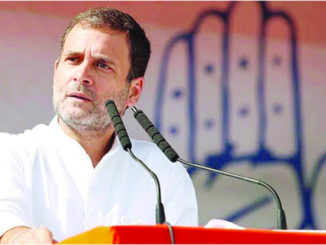
India is a member of several intergovernmental organizations, such as the United Nations, the Asian Development Bank, BRICS, and the G-20. which is widely considered the main economic locus of emerging and developed nations. India exerts a salient influence as the founding member of the Non-Aligned Movement. India has also played an important and influential role in other international organisations, such as the East Asia Summit, World Trade Organization, International Monetary Fund (IMF), G8+5 and IBSA Dialogue Forum. India is also a member of the Asian Infrastructure Investment Bank and the Shanghai Cooperation Organisation. As a former British colony, India is a member of the Commonwealth of Nations and continues to maintain relationships with other Commonwealth countries.
India–United States relations
U.S.-India relations entered a new chapter as Prime Minister Narendra Modi and President Joe Biden announced a slew of technology and defense deals, during Modi’s recent visit to the United States.
“When India and the U.S. work together on semiconductors and critical minerals, it helps the world in making supply chains more diverse, resilient and reliable,” Modi said during a speech to the joint session of the U.S. Congress. “We were strangers in defense cooperation at the turn of the century, but now the United States has become one of our most important defense partners.”
The two nations strengthened their defense partnership, striking deals that include building General Electric F414 jet engines in India and repairing deployed U.S. Navy ships in Indian shipyards.
Still, the U.S. and India are not allies and their relationship will be very different from what other countries in the region have with Washington.
India-China LAC row
As the military standoff with China on the Line of Actual Control (LAC) enters its fourth year, New Delhi is in no mood to acquiesce to Beijing’s recent efforts to promote a narrative that the situation in Ladakh is stable and moving towards “normalised management”.
The border row in eastern Ladakh erupted into the open with a skirmish between troops of the two nations at Pangong Lake in early May 2020. A brutal clash at Galwan Valley the following month, which resulted in the death of 20 Indian soldiers and at least four Chinese troopers, took bilateral ties to their lowest point in six decades.
The resolution of outstanding problems along the LAC appears elusive, with the latest round of military talks between the two sides on April 23 yielding no outcome, and the last breakthrough coming in September 2022.
India-China relations cannot be normalised without peace and tranquillity on the LAC, the people cited above said, requesting anonymity. In this context, they pointed to friction points such as Depsang and Demchok and external affairs minister S Jaishankar’s recent remarks that the situation on the LAC remains “very fragile” as there are points where Indian and Chinese troop deployments are “quite dangerous”.
Indo-Pakistan relations
The two nations have a complicated and mainly antagonistic relationship founded on several historical and political events, most notably the partition of British India in August 1947; the India-Pakistan border is one of the world’s most militarised international boundaries.
Since British India’s partition in 1947, territorial disputes over the Kashmir area have caused two of the three major Indo-Pakistani wars, in 1947 and 1965, and a limited war in 1999 (Kargil war).
However, India wants cordial relations with Pakistan as part of its “Neighborhood First Policy.”
India’s continuous view is that conflicts between India and Pakistan should be addressed bilaterally and peacefully.
India would not compromise on national security matters and will take robust and decisive action to counter all attempts to undermine India’s security and territorial integrity.
India-Sri Lanka relations
India and Sri Lanka have a long history of intellectual, cultural, religious, and linguistic contact spanning over 2,500 years.
Since Independence, India, and Sri Lanka have established bilateral relations on various levels, and significant advancements in the execution of development aid programs for internally displaced people (IDPs) and underprivileged groups of the Sri Lankan population have helped to strengthen the two nations’ relationship.
High-level exchanges of visits have characterized political relations between India and Sri Lanka at periodic intervals.
The India-Sri Lanka Free Trade Agreement (ISFTA) was signed in 1998 and has been in effect since March 2000.
India and Sri Lanka have a strengthening defense partnership based on intensive training and service-to-service links.
The Cultural Cooperation Agreement, signed on November 29, 1977, in New Delhi by the governments of India and Sri Lanka, serves as the foundation for the periodic Cultural Exchange Programs between the two nations.
India-Bhutan Relations
India and Bhutan have a unique and long-standing bilateral relationship marked by mutual trust, friendliness, and understanding.
The unique connection has been fostered through regular high-level visits and conversations between the two nations.
India and Bhutan established diplomatic relations in 1968, creating an Indian special office in Thimphu.
The Treaty of Friendship and Cooperation between India and Bhutan was signed in 1949 and amended in February 2007.
In 2018, India and Bhutan commemorated the Golden Jubilee of the beginning of their official diplomatic relations.
Since the early 1960s, when Bhutan established its Five Year Plans, India has provided economic aid to Bhutan’s socioeconomic growth.
The core of bilateral economic cooperation is mutually beneficial hydropower cooperation with Bhutan.
The Government of India has constantly supported Bhutan’s socioeconomic growth. The two countries cooperation in hydropower is an example of win-win cooperation.
There are active cultural interactions between India and Bhutan. Many Bhutanese pilgrims visit sacred Buddhist places in India.
Most Bhutanese students chose India as their preferred study-abroad destination, and the Indian government provides nearly all of them with scholarships.
India-Maldives Relations
India and the Maldives have ancient ethnic, linguistic, cultural, religious, and commercial ties, and their relations are close, friendly, and multifaceted.
In 1965, India was among the first countries to recognize and establish diplomatic relations with the Maldives following its independence.
In 1972, India established a CDA mission and a resident High Commissioner in 1980.
In November 2004, the Maldives established a full-fledged High Commission in New Delhi, one of the country’s only four diplomatic posts overseas.





Be the first to comment